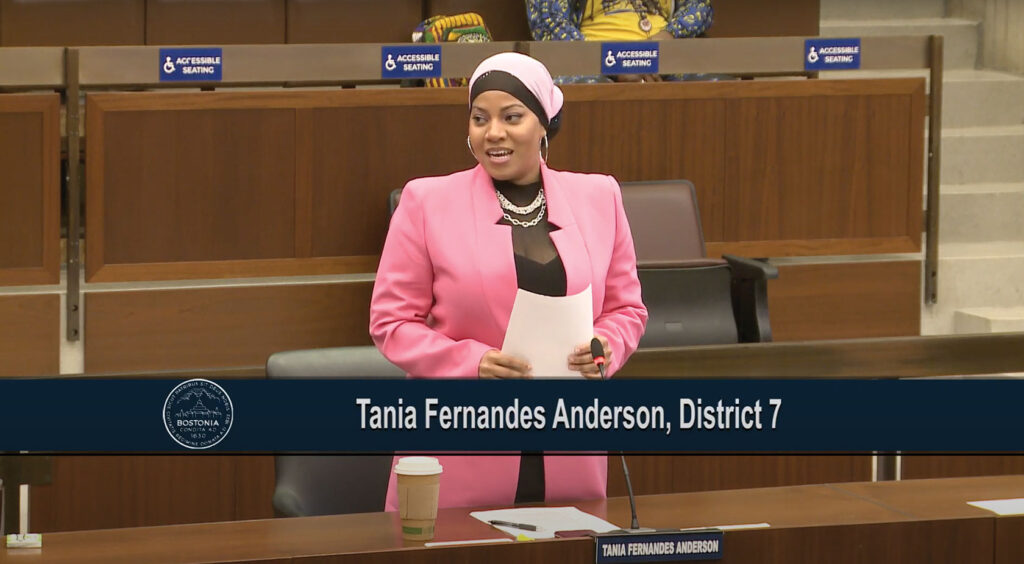Advocates request halt to low-income housing
City Councilor also acknowledges need for affordable residences

Housing designated for low-income households makes up over half the housing in Roxbury. Boston City Councilor Tania Fernandes Anderson has proposed halting plans for more for at least three months.
“I won’t say that this moratorium would be the end-all, be-all,” she told the Banner. “But we need to slow development down to make sure there is time and space for community engagement.”
“It wouldn’t affect any projects already underway,” she explained. But she added that before the city and developers make plans for the district’s remaining 150-250 properties and parcels of land, the district needs time to decide what it needs in addition to housing.
Fernandes Anderson explained the reasons for the moratorium at an April 18 hearing. Pointing to a history of redlining and displacement in Roxbury, Fernandes Anderson said the community needs “conversations about the repercussions of not atoning for harms.”
In February 2022, Fernandes Anderson formed the District 7 Advisory Council, a loosely organized group with 20-40 members consisting of residents and others representing neighborhood organizations in the district.
D7AC has met for over a year to discuss the needs of the district. The moratorium proposal grew out of those meetings, said Diane Wilkerson, a D7AC member and former state senator.
“We decided on this after a year of trying [to] get a conversation with the city,” said Wilkerson. She added that Mayor Michelle Wu’s office had agreed to meetings with the group but met with them only twice last year.
“Our request is that the city engage with the community before they develop,” Wilkerson said. “But the city’s current stated housing policy is counter to that.”
Fernandes Anderson said that while she is in favor of affordable housing for those that need it, she is frustrated with the current development process. She said when the Boston Planning and Development Agency (BPDA) begins planning new buildings in the area, the desires of residents are ignored.
“I’ve been in BPDA hearings where the community … pleaded for open space or green space from these developments, either behind, [on] a rooftop or in front, and they’ve been denied,” she said.
Wilkerson added that development plans are often well under way when residents learn of them.
“By the time developers make a presentation to the people of Roxbury, they’ve been at work for six months to a year,” added Wilkerson.
But there is at least one Roxbury organization looking forward to the city’s development plans.
“So much has been done wrong, it’s going to take a lot to build trust,” said Armani White, a co-founder of Reclaim Roxbury. “But the commitment is real with the new administration.”
White points to specific initiatives as examples of the Wu administration’s desire to build equity into development plans. Among them is the BPDA’s inviting applicants to join a new community advisory board. The board will help “create a plan that represents community-supported values and objectives … in all neighborhoods.” In addition, the BPDA’s “Resilience, Affordability and Equity Challenge” invites community organizations to come up with ways for development to meet goals for racial equity and inclusion.
“I’m looking forward to seeing how these things play out,” White said. “It’s up to us as advocates to show up.”
Reclaim Roxbury is not involved with the D7AC.
“I don’t understand what the advisory council is about, and I don’t want to criticize something I don’t understand,” White said. But despite his optimism, he said vigilance is necessary.
“We’re going to continue to be watchdogs,” said White. “What we want to see is equity, and whether that comes about through a moratorium or other means, we’ll see.”
With nearly one-fifth of its housing stock designated for households with limited or low incomes, Boston is ahead of most major U.S. cities in providing affordable housing. But housing isn’t enough, said Wilkerson.
“In order to get this housing, you have to be poor, and to keep the housing, you have to stay poor,” said Wilkerson. “You can’t build wealth that way.”
Fernandes Anderson said she doesn’t oppose housing for those with limited incomes.
“I am pro development,” she added. “And I want to see more affordable housing in District 7. Affordable housing, however, needs to move toward a more holistic approach and it needs to offer amenities that actually increase the quality of life for residents in District 7.”
What that would look like, she added, would depend on the development project and what residents say they want. Among the ideas are rent-to-own housing and support for businesses started by and employing Roxbury residents.






